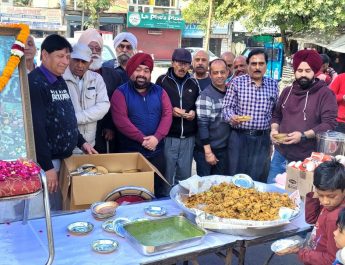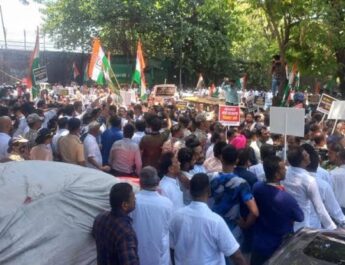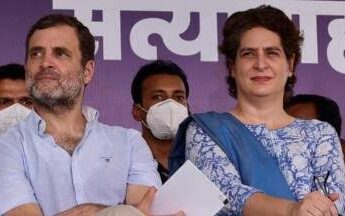From Our Bureau
NEW DELHI: The Congress has convened a brainstorming session of all its national general secretaries and the in-charges of the states here on Saturday to discuss the recent crushing defeat in the Assembly elections in five states, draw up a programme for the future agitations and the current political situation.
Organising general secretary K C Venugopal will preside over the meeting at the party headquarters while Congress president Sonia Gandhi may also attend to review the party’s ongoing membership drive. In a circular, Venugopal has asked all to attend as the party has to draw up the organisational election calendar and decide how to cope up with the future Assembly elections, including those in
Gujarat later this year.
The meeting comes in the backdrop of Sonia Gandhi talking to the leaders of the G-23 group, which is critical of the party leadership and which has been demanding an organisational overhaul for a long time. Those consulted by her included Ghulam Nabi Azad, Anand Sharma, Manish Tewari and Vivek Tankha.
The Congress is facing not only an internal crisis as the role of the Nehru Gandhi family that has been steering the party’s political fortunes since the 1969 split in the party and former Prime Minister Indira Gandhi emerged as a powerful magnet around whom the country’s oldest party revolved. Now questions are being asked about the role of Gandhis in the Congress, it remains to be seen what transpires in coming weeks and months.
Biggest question that is being asked by political leaders, seasoned political observers and Congress haters is what role Gandhis would have after the organisational elections. Puzzlingly, there is no clear answer. Most G-23 dissenters ‘feel’ (or is it wishful thinking?) that Sonia Gandhi would not prop up Rahul Gandhi as a candidate for the top party post.
The Congress organisational polls are invariably loaded in favour of an ‘official’ or endorsed nominee. Sonia Gandhi herself won against Jitendra Prasada in 1999, netting over 96 per cent of votes. Two years earlier, Sitaram Kesri had beaten both Sharad Pawar and Rajesh Pilot when Kesri, already holding the AICC president’s post, had bagged over 75 per cent of votes.
The peace formula or truce, tentatively worked out between Sonia Gandhi and G-23, appears to be to give some concessions to G-23 protagonists. In exceptional cases, (like Ghulam Nabi Azad), the possibility of a Rajya Sabha nomination seems to have been promised, while other notables have been assured berth in the Congress Working Committee (CWC).
The CWC is supposedly a 24-member body consisting of 12 elected members (elected by AICC delegates) and an equal number to be nominated by the Congress president. The nominated category is expected to provide wider representation to the weaker sections, women and minorities.
Critics within and outside the Congress view Sonia Gandhi’s efforts as ‘too little, too late’ on grounds that these peace formulae and truce talks have little to shore up the Congress’ prospects in either ensuing assembly polls or for the 2024 Lok Sabha polls.
Yet, a dominant view in the party is to credit Sonia Gandhi with an extraordinary feat of preventing a split in the Congress.
For a majority of Congress leaders, the extraordinary journey of Sonia from a middle-class girl from Orbassano, Italy to a politician among the politicians in Indian politics is a fascinating story.
Her act of renunciation in 2004, the choice of Manmohan Singh as the prime minister, a fine balance between ‘economic Right and social Left’ during the UPA rule were flawless until the fabled sycophancy of Congress leaders coloured her political judgment in a tragic and disastrous way.
Trappings of power made Sonia Gandhi always judicious about self, into believing that she could keep a ‘seat’ warm for Rahul Gandhi. Politics is too complex and consists of a lot of invariables and often enough does nor develop according to a script as there are lots of imponderables.
Paradoxical as it may sound, Sonia Gandhi, in her desperate bid to shore up the Congress prospects after the 2019 general election and keep the party cadre motivated, had over-ruled son Rahul Gandhi on May 25, 2019.
Rahul Gandhi, 87th president of the AICC, while owning up 2019 poll debacle, had resigned and insisted upon a condition that his successor will not be from among the Nehru-Gandhi family members nor would they play any role in the selection of Rahul Gandhi’s replacement.
In retrospect, Rahul Gandhi’s stand had a lot of merit. If it was implemented in letter and spirit, the subsequent events would have saved the Gandhis from a lot of humiliation and disgrace.
What was worse was that Rahul Gandhi himself turned out to be a bundle of contradictions. He opposed Sonia Gandhi’s appointment as interim president in August 2019 but went on to be the biggest beneficiary, running the party organisation by proxy.
But electoral success was nowhere in sight. Kerala was snatched away. In Assam, the BJP staged a great comeback and Rahul Gandhi’s reckless gambles in Punjab, Goa and Uttarakhand boomeranged.
Sonia Gandhi’s own record as interim president from August 2019 till now has been dismal and long dragged. Some Congress leaders say she cannot escape the blame for dragging her feet between August 2019 and March 10, 2022.
Sources close to Sonia Gandhi, however, say her life has largely been shaped by circumstances rather than her free will. She was opposed to the idea of Rajiv Gandhi joining politics after Sanjay Gandhi’s death and Rajiv Gandhi taking over as prime minister after Indira Gandhi’s assassination, but on both occasions, circumstances forced her to accept destiny.
After Rajiv Gandhi’s assassination, she had shown a degree to firmness to say no to politics when the entire Congress Working Committee, led by Pranab Mukherjee, had pleaded her to be Rajiv Gandhi’s successor. By 1997, many Congress leaders like Aslam Sher Khan, Mani Shankar Aiyar, PR Kumaramangalam, Suresh Kalmadi, and Buta Singh had deserted the grand old party.
In despair, a number of middle-rung leaders such as Digivijaya Singh, Ahmed Patel, Ashok Gehlot, Vayalar Ravi and Kamal Nath had approached “apolitical” Sonia Gandhi with a plea: “How can you allow the collapse of the Congress before your eyes.”
Faced with a collapse, whether she along with Rahul and Priyanka succeed in reinventing the party to take on the challenge from the RSS-BJP that is relentlessly working for a Congress-Mukt Bharat is a question whose answer nobody has today though a large majority of well meaning countrymen are keeping their fingers crossed.
###




